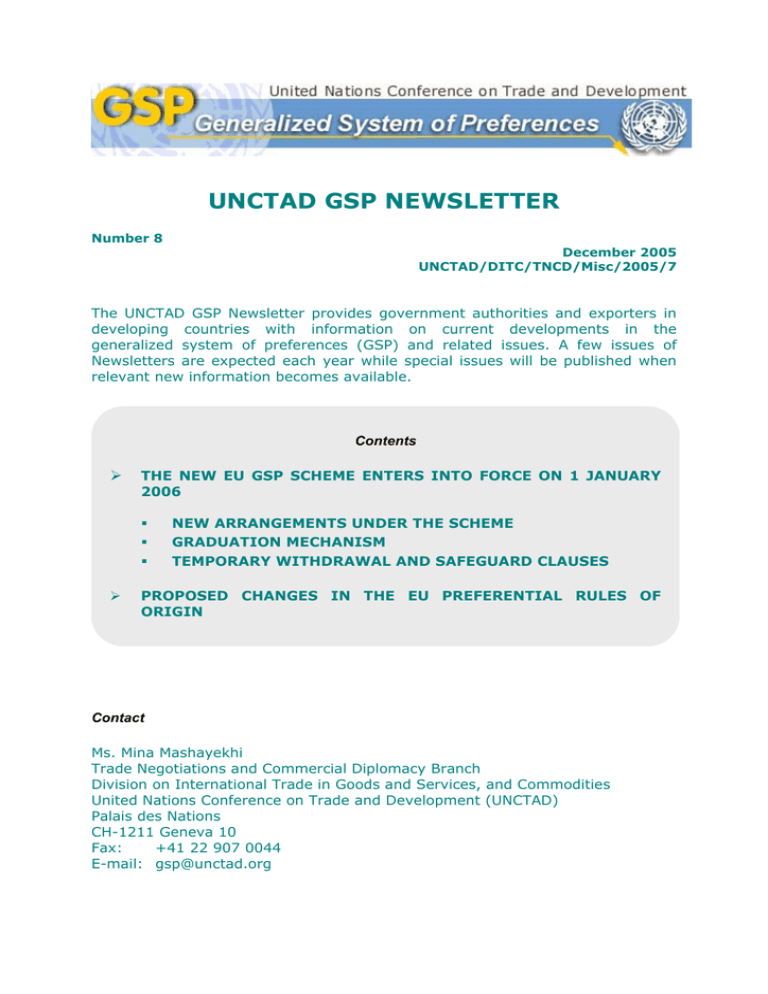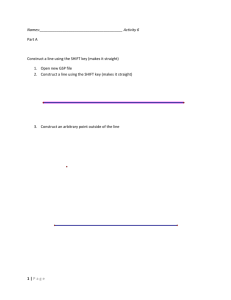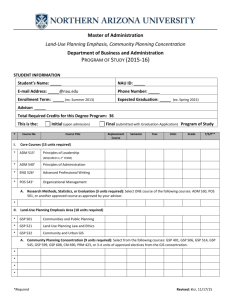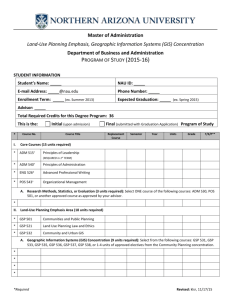UNCTAD GSP NEWSLETTER
advertisement

UNCTAD GSP NEWSLETTER Number 8 December 2005 UNCTAD/DITC/TNCD/Misc/2005/7 The UNCTAD GSP Newsletter provides government authorities and exporters in developing countries with information on current developments in the generalized system of preferences (GSP) and related issues. A few issues of Newsletters are expected each year while special issues will be published when relevant new information becomes available. Contents ¾ THE NEW EU GSP SCHEME ENTERS INTO FORCE ON 1 JANUARY 2006 ¾ NEW ARRANGEMENTS UNDER THE SCHEME GRADUATION MECHANISM TEMPORARY WITHDRAWAL AND SAFEGUARD CLAUSES PROPOSED CHANGES IN THE EU PREFERENTIAL RULES OF ORIGIN Contact Ms. Mina Mashayekhi Trade Negotiations and Commercial Diplomacy Branch Division on International Trade in Goods and Services, and Commodities United Nations Conference on Trade and Development (UNCTAD) Palais des Nations CH-1211 Geneva 10 Fax: +41 22 907 0044 E-mail: gsp@unctad.org ¾ NEW EU GSP SCHEME ENTERS INTO FORCE ON 1 JANUARY 2006 The European Union’s (EU) new GSP scheme for 2006-2008 came into force on 1 January 2006. Adopted by the EU on 27 June 2005 in Council Regulation (EC) No. 980/2005, the new regime seeks to make the GSP scheme easier to use, as well as more transparent and stable. The new GSP scheme will be in place until 31 December 2008. The newly introduced special incentive arrangement for sustainable development and good governance, known as “GSP-Plus”, came into force earlier on 1 July 2005. The previous special incentive scheme (implemented by Council Regulation (EC) No. 2501/2001) — covering special arrangements to combat drug production and trafficking — had to be removed by that date to comply with the WTO Arbitrator’s decision of 20 September 2004 following a complaint submitted by India (see GSP Newsletter No.6 for more information on this dispute). No changes have been introduced with regard to rules of origin (see the following section). - Regime 1 - General arrangement As regards the product coverage, the new regime increases product coverage from 6,900 to about 7,200 products. The newly included 300 products are mostly agricultural and fishery products. Products receive different tariff treatment under the general arrangement according to their sensitivity. Under the scheme, the products are classified into “sensitive” and “non-sensitive” products. Nonsensitive products enter the EU free of duty. Around half of GSP-covered products are considered ‘non sensitive’. For sensitive products, the duty is reduced by 3.5 percentage points (e.g., if the MFN rate is 14 per cent, the GSP rate is 10.5 per cent). Exceptions to this treatment are: 1) All textile and clothing products will continue to be subject to a 20 per cent reduction (e.g. if the MFN tariff is 12 per cent, 9.6 per cent will be due under the GSP system). Three arrangements in the new scheme (2006-2008) General arrangement “GSP-Plus” Special arrangements for LDCs (EBA) 2) Specific duties (e.g. €50 per 100kg) applicable to sensitive products will be reduced by 30 per cent of MFN rate (ethyl alcohol will be reduced by 15 per cent); As compared to the previous GSP scheme where five different specific arrangements were in force, the new GSP scheme reduces the number to three (see boxes for comparison of the two schemes). 3) Where tariffs on sensitive products are composed of ad valorem and specific duty, the 3.5-percentage-points reduction will apply to the ad valorem duty only. The full amount of the specific duty will still be due. Five arrangements under the previous scheme (2002-2005) NEW ARRANGEMENTS UNDER THE SCHEME De minimis limit applies whereby when the ad valorem preferential rate reaches 1 per cent or less, or specific duty values of €2 or less, it is automatically reduced to zero. General arrangement Labour regime Environment regime Drug regime Special arrangements for LDCs (EBA) 2 financial needs to which the special incentive scheme was intended to address. The Appellate Body ruled that these needs should be assessed on the basis of an objective standard and administered in a non-discriminatory manner (see GSP Newsletter No.6). Regime 2 – Special incentive arrangement (“GSP-Plus”) A notable feature of the new GSP scheme is the introduction of the single special incentive arrangement for sustainable development and good governance, or “GSP-Plus”. This streamlines and replaces the previous separate regimes on ‘drugs’, ‘labour’ and “environment”. The arrangement is geared towards “vulnerable countries” that is, low and middle-income, smallsized economies with limited export diversification - and aimed at promoting compliance to, and respect for, core human rights and internationally agreed labour standards, as well as environmental standards and governance principles. The GSP-Plus arrangement provides additional margin of preferences only to those countries that adopt certain policy measures, thus provides “incentive” for them to adopt certain policy standards in the areas of sustainable development and good governance. In the new GSP-Plus, eligibility criteria are based on “vulnerability” of countries and their compliance with the preestablished set of international conventions. A country is deemed to be “vulnerable” when it meets the following three criteria: 1) First of all, the country should not have been classified as a high-income country in the previous three consecutive years according to World Bank definition (GNI per capita at $10,066 or more). This limits the benefits only to lowincome and middle-income countries. 2) Secondly, the five largest sections of GSP-covered imports to the EU from the country must represent more than 75 per cent in value of the total GSPcovered imports from the country. This implies that the country must have an undiversified export structure in respect of export products and depend on a few export commodities. The GSP-Plus arrangement allows beneficiary countries to enjoy duty free treatment when exporting 7,200 GSPcovered products to the EU regardless of whether the products are classified as sensitive or non-sensitive products. Exception is made for those agricultural products that are subject to both ad valorem and specific duty; in this case, the zero rate only applies to the ad valorem component. Thus, the total duty payable equals to the specific duty. The special incentive does not apply to those sections of products for which tariff preferences have been withdrawn on the basis of graduation (see below). 3) Thirdly, GSP-covered imports from the country in question must represent less than 1 per cent of total EU imports from all beneficiary countries under the GSP. Thus, this criterion limits the benefits to countries that export only small quantity of products to the EU. In order to receive GSP-Plus benefits, vulnerable county must fulfil additional requirements regarding their ratification and implementation of international conventions in the areas of human rights, labour, environment and good governance. The GSP-Plus system seeks to respond to the WTO Appellate Body ruling on European Communities – Conditions for the Granting of Tariff Preferences to Developing Countries by ensuring clearer objective criteria for eligible countries. In this dispute, the Appellate Body found the EU’s previous drug incentive scheme incompatible with Enabling Clause, as it did not provide “identical treatment” to “similarly-situated” developing countries in terms of development, trade and Firstly, the country should have ratified and effectively implemented 16 international conventions listed in the Annex III.A of (EC) No. 980/2005 concerning core human and labour rights UN/ILO conventions. These are International Covenant on Civil and 3 Political Rights; International Covenant on Economic, Social and Cultural Rights; International Covenant on the Elimination of All Forms of Rational Discrimination; Convention on the Elimination of All Forms of Discrimination Against Women; Convention Against Torture and other Cruel, Inhuman or Degrading Treatment or Punishment; Convention on the Rights of the Child; Convention on the Prevention and Punishment of the Crime of Genocide; Convention concerning Minimum Age for Admission to Employment; Convention concerning the Prohibition and Immediate Action for the Elimination of the Worst Forms of Child Labour; Convention concerning the Abolition of Forced Labour; Convention concerning Forced or Compulsory Labour; Convention concerning Equal Remuneration of Men and Women Workers for Work of Equal Value; Convention concerning Discrimination in Respect of Employment and Occupation; Convention concerning the Freedom of Association; Convention concerning the Application of the Principles of the Right to Organise and Bargain Collectively, and; International Convention on the Suppression and Punishment of the Crime of Apartheid. Convention on Narcotic Drugs; United Nations Convention on Psychotropic Substances; United Nations Convention against Illicit Traffic in Narcotic Drugs and Psychotropic Substances, and; United Nations Convention against Corruption. To apply for the special incentive under the GSP-Plus regime, an eligible country needed to submit a formal request by 31 October 2005. The European Commission has designated fifteen countries as eligible for GSP-Plus; they are: Bolivia, Colombia, Costa Rica, Ecuador, Guatemala, Honduras, Nicaragua, Panama, Peru, El Salvador, Venezuela, Georgia, Sri Lanka, Moldova and Mongolia. Among them, only Georgia and Mongolia were not included in any of the special incentive arrangements — the “labour”, “environment” and “drug” regimes — offered in the last cycle. All countries included in the ‘drug regime’ continue to be beneficiaries of the GSP-Plus scheme; the only exception is Pakistan, which became a beneficiary of the general GSP scheme on 1 July 2005 (thus, special incentive no longer applies). Covered under the ‘labour regime’ in the last cycle, the Republic of Moldova and Sri Lanka, the only two countries under the previous ‘labour regime’, continues to be included in the GSP-Plus arrangement. Secondly, the country should have ratified and effectively implemented at least seven out of eleven conventions listed in Part B of Annex III of the aforementioned regulation regarding the environment and governance principle, and commit itself to ratify and effectively implement by 31 December 2008 those conventions which it has not yet ratified or effectively implemented. The eleven convention include: the Montreal Protocol on Substances that Deplete the Ozone Layer; Basel Convention on the Control of Transboundary Movements of Hazardous Wastes and Their Disposal; Stockholm Convention on Persistent Organic Pollutants; Convention on International Trade in Endangered Species of Wild Fauna and Flora; Convention on Biological Diversity; Cartagena Protocol on Biosafety; Kyoto Protocol to the United Nations Framework Convention on Climate Change; United Nations Single Regime 3 - Special arrangement for LDCs (EBA) The “Everything but Arms” (EBA) arrangement, launched in 2001, which grants duty and quota free access for all imports from LDCs, as far as they remain in the category of LDCs designated by the United Nations, with the exception of arms (products of HS Chapter 93) will remain unchanged. The scheme is available for 49 LDCs officially recognized as such by the United Nations. Timor Leste was added in the new GSP system, bringing to 50 the total number of countries beneficing from EBA. Three sensitive products are subject to special treatment under EBA: bananas, rice and sugar. In the case of sugar, the 4 progressive reduction will begin on 1 July 2006, and a zero tariff will apply as of 1 July 2009. Reduction of tariffs on rice will start on 1 September 2006 so that tariffs will be entirely eliminated on 1 September 2009. Reduction of tariffs on bananas commenced on 1 January 2002 and zero duty started to apply as from 1 January 2006. For rice and sugar, a global tariff quota at zero duty has been opened for LDCs for each marketing year as of 2001/2002, subject to 15 per cent increase each year. the EU must represent less than 75 per cent of the total GSP-covered imports of the country to the EU. This criterion replaces the one based on “development index” used in the previous EU GSP scheme. The new criterion seeks to ensure that a country, even if it is classified as high-income country, is not excluded from the scheme if the country still remains dependent on a few products for a large proportion of its exports to the EU. No countries have been excluded from the EU’s GSP schemes since 1997 when Korea, Singapore and Hong Kong were excluded from beneficiary country list. The timing of the total duty and quota elimination for LDCs under EBA in respect of sugar and bananas has a bearing on the prospects of the EU’s implementation of the recent agreement reached at the sixth WTO Ministerial Meeting in Hong Kong (China) on 13-18 December 2005, to provide duty-free and quota-free market access for all products from all LDCs by 2008 “or no later than the start of the implementation period” of the results of the Doha round. Annex F of the Hong Kong Ministerial Declaration also provides that “Members facing difficulties at this time to provide market access as set out above shall provide duty-free and quota-free market access for at least 97 per cent of products originating reform LDCs, defined at the tariff line level by 2008 or no later than the start of the implementation period”. - As regards product-specific graduation, in the previous cycle, this was based on the combination of several criteria including: share of GSP imports, “development index” and “exportspecialization index”. The new system replaces them with single straightforward criterion: the share of the country’s imports under GSP in a given section. The threshold level is set at 15 per cent. This compares with 25 per cent threshold level adopted in the previous GSP scheme (albeit together with other criteria). Graduation of products applies to a “section” of the Harmonized System of Commodity Codes. According to this criterion, a country will be excluded from the preferential treatment in respect of products if the average value of GSPcovered imports of the products at the section level from the country exceeds 15 per cent of the value of EU’s total GSP-covered imports of the same products from all beneficiary countries over three consecutive years. GRADUATION MECHANISM As in the previous GSP cycle, two types of graduation mechanism continue to apply under the EU GSP scheme; namely (i) county graduation and (ii) productspecific graduation. Changes have been introduced in respect of the criteria with which exclusion of a country from preferential treatment is determined. Textiles and clothing products are subject to more stringent rules. Firstly, the lower threshold level of 12.5 per cent, instead of 15 per cent, applies. Secondly, Section XI comprising textiles and clothing products is treated, for the purpose of GSP, as two separate sections with one comprising Chapters 50-60 (row materials, fabric, fibres and yarn) and the other comprising Chapters 61-63 (apparel and clothing articles). Thus, product-specific graduation is likely to As regards country graduation, two criteria have to be met before a beneficiary country is excluded from the GSP treatment in its entirety. First, the country must have been classified by the World Bank as a high-income country during three consecutive years. Second, the value of imports for the five largest sections of its GSP-covered imports to 5 withdrawal of preferences to a beneficiary country for a variety of reasons (e.g. serious and systematic violation of the conventions; export of goods made by prison labour; serious shortcomings in customs controls on the export or transit of drugs; unfair trading practices). Furthermore, GSP-Plus incentives may also be temporarily withdrawn if a country’s national legislation no longer incorporates the conventions ratified, or if such legislation is not effectively implemented. Preferences may also be temporarily withdrawn in cases of fraud or systematic failure in complying with rules of origin. more easily be invoked in the case of textiles and clothing products as compared to other product categories. There is one exception to the general rule of product-specific graduation. The rule does not apply to the section that represents more than 50 per cent in value of all GSP-covered imports of the country in question. This provides some comfort to those countries that have less diversified export structure (at least as far as exports to EU is concerned) to such an extent that as much as a half of its total GSP-covered exports to EU is accounted for by one section of products. It may also be noted that, since the threshold level of 15 per cent market share needs to be met for three consecutive years, this provides “early warning” for the country concerned before graduation is actually effected. Similarly, since the graduation applies to products at the section level, this preempts the likelihood whereby a country competitive, thus having substantial market share, only in a limited products within a section be excluded from the preferential treatment. As noted, however, this is true only to a lesser extent in the case of textiles and clothing that are treated as two separate sections. As in the previous GSP cycle, the EU GSP scheme incorporates two safeguard clauses for products other than agricultural products and for those agricultural products subject to Common Agricultural Policy respectively. The both mechanisms allow for re-introduction of MFN rates (i.e., suspension of preferential treatment) for a given product under certain conditions, which differ across the two clauses. In the case of non-agricultural products, a product must be imported “on terms which cause, or threaten to cause, serious difficulties to EU producers of like or directly competing products”. In the case of agricultural products, imports of products must “cause, or threaten to cause, serious disturbance to Community market, in particular to one or more of the outermost regions, or these market’s regulatory mechanism”. According to the new criteria, the following countries have been excluded from the GSP treatment in respect of at least one product section: Brazil, China, Algeria, Indonesia, India, Malaysia, Russian Federation, Thailand, and South Africa. It is particularly notable that 80 per cent of the Chinese exports to the EU, including textiles and clothing, is graduated. This means that India will replace China as the largest EU GSP beneficiary country. On the other hand, the new regulation redefines GSP safeguard clauses specific to clothing and apparel products (not textiles products) to take account of the new graduation mechanism. Under this rule, it is mandatory for the European Commission to remove preferences under general arrangements or GSP-Plus regime for a country whose imports of clothing increase by at least 20 per cent in quantity as compared to the previous calendar year, or exceed 12.5 per cent of the value of total clothing imports from all GSP countries during any 12-month period. Exempted from this safeguard Graduation will be assessed at the end of 2008, except in the case of textile and clothing, which will continue to be reviewed on an annual basis. - TEMPORARY WITHDRAWAL AND SAFEGUARD CLAUSES The new GSP regulation, as in the previous scheme, allows for temporary 6 mechanism are LDCs and those countries whose share of imports does not exceed 8 per cent. ¾ PROPOSED CHANGES IN THE EU’S PREFERENTIAL RULES OF ORIGIN While no change has been introduced in the new EU GSP scheme, extensive review is underway with regard to preferential rules origin applicable to EU’s preferential trading arrangements, including GSP. improve the origin of fishery products through the nationality vessels by basing the determination on the flag, registration, simplified but adequate conditions regarding property, and the crew conditions. The review process was launched in December 2003 when the EU circulated a Green Paper on future rules of origin to GSP beneficiary countries and other interested parties inviting suggestions. Subsequently, extensive consultation took place from January until March 2004. On 16 September 2004, the Commission published the summary report on the outcome of the consultation process. The report aimed to guide the European Commission in formulating new rules of origin for the next 10-year GSP cycle. The report stressed, inter alia, how current rules of origin fall short of recognizing economic reality, such as the global production model of the market and new manufacturing and processing operations. As regards “sufficiently worked or processed products”, noting that basic origin rules should reflect production capacity of countries and processing operations, the Communication suggests the use of a single, across-the-board criterion based of value-added test, as opposed to the current system of multiplicity of different rules varying from product to product, for determining the origin of goods. The Communication, however, does not specify threshold level of value added required for the acquisition of origin status, but notes that this should be determined carefully including through simulation exercises. According to the Communication, it is imperative that that developing countries’ current level of access to EU market should not be reduced by the new origin rules. Thus, there is the possibility that different percentage be fixed in different sector so as not to exceed the production capacities of developing countries. Furthermore, specific threshold level may be established for LDCs under EBA. For certain sectors including agriculture, fishery and textiles, there may be the need to adopt approaches other than value added criteria to better achieve expected objective of revised rules. On 16 March 2005 The European Commission adopted a Communication (COM (2005) 100 final) outlining the broad direction of its planned reform of rules of origin. The reform suggested by the Communication is geared towards simplifying and streamlining origin criteria and cumulation rules and the formalities and controls. The Communication characterizes the overall approach to the revision as “appropriate rules, efficient procedures, and secured environment”. As regards cumulation of origin, the Communication notes, in respect of GSP, the Commission’s willingness to examine request for establishing new, merged or wider group for cumulation insofar as economic complementarities exist (in addition to three groupings within which cumulation is allowed under EU GSP, namely ASEAN, SAARC, and the Specifically, the Communication proposes to introduce several elements in the EU preferential rules of origin. In respect of substantive origin rules, it seeks to introduce appropriate rules to determine the acquisition of the origin status. For “wholly obtained products”, the Communication notes the need to 7 combined group of the Andean Community and the Central American Common Market). While the desirability of progressive extension of “full cumulation” is noted in respect of reciprocal free trade agreements, such a possibility is excluded in respect of GSP. Instead, it proposes to replace the current “double conditions” for the allocation of origin to a member country of a group by a single condition based on the value added test. The “double conditions” refer to the following two conditions for a country exporting to EU final goods composed of parts and materials originating in other countries of the same regional group: (i) the value added in the country claiming origin of the final goods must be greater than the highest value of the materials used originating in any other countries of the group; and (ii) the processing carried out in that country must be more than “insufficient working or processing”. According to the proposal, a product will be considered as originating in the country of the group where the final processing on materials takes place if the value added in that country is higher than a pre-established standard percentage of value added. This percentage is proposed to be fixed at a level much lower than the one required for the same product where resulting from a processing of non-originating material. Apart from the proposed changes to substantive rules, the Communication proposes to introduce efficient procedures and clearer responsibilities of operators and authorities in establishing and controlling rules of origin, as well as a secured environment for the operation of rules of origin by adopting measures that support compliance by public authority and cooperate in preventing and fighting abuse. The European Commission has expressed its intention to implement new rules of origin in 2006 but is yet to table specific proposals on new rules of origin applicable to GSP. 8 ¾ UNCTAD PUBLICATIONS Handbook on the Scheme of Australia (UNCTAD/ITCD/TSB/Misc.56) Handbook on the Scheme of Bulgaria (UNCTAD/ITCD/TSB/Misc.67) Handbook on the Scheme of Canada (UNCTAD/ITCD/TSB/Misc.66) Handbook on the Scheme of the Czech Republic (UNCTAD/ITCD/TSB/Misc.63) Handbook on the Scheme of the European Community (UNCTAD/ITCD/TSB/Misc.25/Rev.1) Handbook on the Scheme of Hungary (UNCTAD/ITCD/TSB/Misc.64) Handbook on the Scheme of Japan (UNCTAD/ITCD/TSB/Misc.42/Rev.2) Handbook on the Scheme of New Zealand (UNCTAD/ITCD/TSB/Misc.48) Handbook on the Scheme of Norway (UNCTAD/ITCD/TSB/Misc.29) Handbook on the Scheme of Poland (UNCTAD/ITCD/TSB/Misc.51) Handbook on the Scheme of the Slovak Republic (UNCTAD/ITCD/Misc.50) Handbook on the Scheme of Switzerland (UNCTAD/ITCD/TSB/Misc.28/Rev.1) Handbook on the Scheme of the United States (UNCTAD/ITCD/TSB/Misc.58) Digest of Schemes (UNCTAD/TAP/136/Rev.7) Digest of Rules of Origin (UNCTAD/TAP/133/Rev.7) Improving Market Access for Least Developed Countries (UNCTAD/DITC/TNCD/4) Quantifying the Benefits Obtained by Developing Countries from the GSP (UNCTAD/ITCD/TSB/Misc.52) Globalization and the International Trading System – Issues relating to rules of origin (UNCTAD/ITCD/TSB/2) Compendium on Rules of Origin, Part I (UNCTAD/ITD/GSP/31) All publications are freely available at: http://www.unctad.org/Templates/Page.asp?intItemID=1418&lang=1 9





